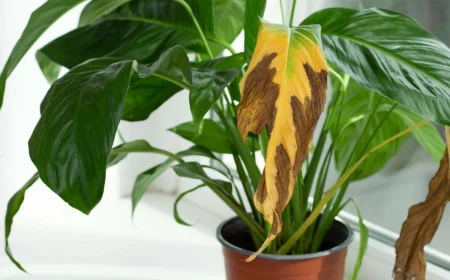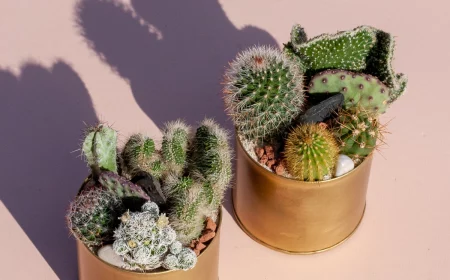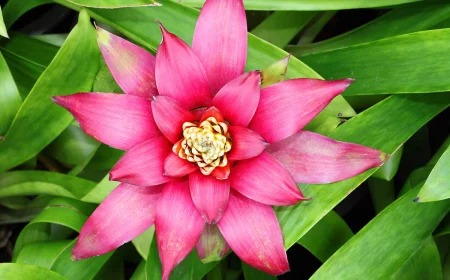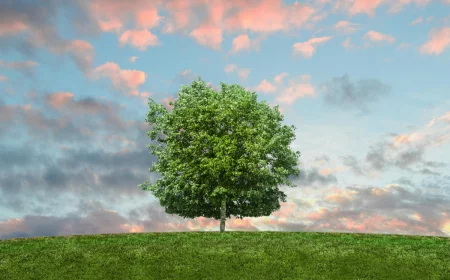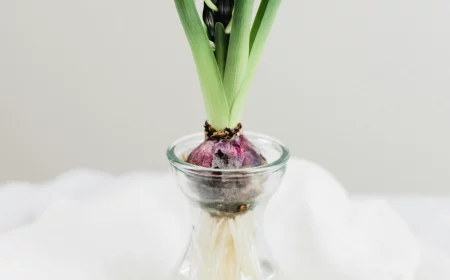Your Ultimate Guide to a Stunning Purple Garden (Without the Headaches)
I’ve been elbows-deep in dirt, designing and planting gardens for a long time, and if there’s one color people ask for over and over again, it’s purple. There’s just something about it. It has this incredible ability to make a garden feel both wonderfully calm and seriously special. But here’s the secret: a truly great purple garden isn’t about grabbing every purple plant you see at the nursery.
In this article
It’s really a partnership between your dream garden and what your actual patch of land is willing to do. And by the way, you’re not just picking a pretty color. Purple is a high-energy powerhouse on the light spectrum, and for pollinators like bees, it’s basically a neon sign for an all-you-can-eat nectar buffet. So when you plant purple, you’re sending a direct invitation to the good guys who keep your garden humming along.
This guide is built on years of real-world trial and error—the stuff that works and, just as importantly, the stuff that doesn’t. We’re going to get into the nitty-gritty details, from prepping your soil the right way to choosing plants that will actually thrive where you put them.

First Things First: Know Your Dirt, Sun, and Zone
Before you even think about buying a single plant, you have to get to know your space. Honestly, this is the most critical lesson in all of gardening. A fancy, expensive plant in the wrong spot is doomed. A simple, common plant in the perfect spot will look like a million bucks. Your success hinges on three things: soil, sun, and your climate.
Getting Real About Your Soil
Plants get everything from the soil, so if your soil is bad, your plants will be weak. You always see plant tags that say “needs well-drained soil,” but what does that even mean?
Let’s figure out what you’re working with. Go out and grab a handful of your garden soil when it’s a bit damp. Squeeze it hard. If it forms a slick, shiny ball that stays together, you’ve got heavy clay. If it’s gritty and falls apart instantly, you have sandy soil. The sweet spot is loam—it holds its shape but crumbles easily when you poke it.

Most of us don’t have perfect loam, and that’s okay. If you have heavy clay that holds water and rots roots, you need to amend it. We do this by adding organic matter like compost or well-rotted pine bark. For a brand-new 4×8 foot garden bed, I’d plan on buying 6 to 8 of the 2-cubic-foot bags of good-quality compost. Expect to pay around $50 to $80 for this, and trust me, it’s the best money you’ll spend on your garden. Spread about 3-4 inches over the top and use a garden fork to work it into the top 8-10 inches of soil. This isn’t a one-and-done deal; top-dressing with an inch of compost every spring keeps it healthy.
Quick tip: Grab a simple soil test kit from your local garden center. It’ll tell you your soil’s pH. Most popular purple flowers are happiest with a pH between 6.0 and 7.0 (slightly acidic to neutral).

Map Your Sunlight Like a Pro
“Full sun” means 6+ hours of direct sun hitting the plant. “Part sun” or “part shade” is usually 4 to 6 hours, ideally gentle morning sun. “Shade” is less than 4 hours.
Don’t guess. Seriously, spend a day just watching your yard. Notice which spots get sun and when. An area that gets blasted by the sun from noon to 4 p.m. is way harsher than one that gets sun from 8 a.m. to 2 p.m. Knowing this is everything.
The A-List: Reliable Purple Perennials That Just Work
Alright, let’s talk plants. These are some of the most dependable and gorgeous purple perennials I use all the time. These are the ones that come back year after year.
1. Salvia (Perennial Sage)
If I could only plant one purple perennial, it would probably be Salvia. It’s tough as nails once it’s established, hummingbirds and bees go crazy for it, and its flower spikes give you fantastic vertical interest. A smaller starter plant will run you about $8, with larger, nursery-grown ones closer to $20.

- Our Go-To Pick: ‘Caradonna’ is a standout. The stems are a dark, almost black-purple, which makes the violet flowers pop even more. ‘May Night’ is another solid choice.
- How to Make It Thrive: Salvia absolutely requires full sun and soil that drains well. It will literally rot in wet clay. Give them about 18 inches of space between plants for good airflow.
- Lesser-Known Trick: The key to getting a second or even third round of flowers is to be bold. Once the first blooms fade, don’t just snip off the dead flowers. Take your shears and cut the entire flower stalk all the way back to the main clump of leaves at the base. It feels scary, but in a few weeks, you’ll be rewarded with a whole new show.
2. Lavender (Lavandula)
Ah, lavender. Everyone loves it, but so many people kill it. The secret is to treat it mean. It comes from the dry, rocky hills of the Mediterranean, so you have to replicate that.

- The Right Kind Matters: For colder climates (Zones 5-6), you must use English lavender. ‘Munstead’ and ‘Hidcote’ are two of the toughest. For warmer zones or pots, you can use French or Spanish types.
- How to Make It Thrive: Lavender needs two things: hot, all-day sun and soil that drains super fast. It hates having wet roots, especially in winter. If you have clay soil, either amend it heavily with sand or gravel or, even better, plant it in a raised bed.
- Pruning is a MUST: If you don’t prune lavender, it gets woody, leggy, and sad. We prune ours right after it flowers in the summer, cutting back about a third of the leafy growth but always staying above the hard, woody base. Cutting into the old wood can kill it. I’ve seen more lavender killed by kindness (too much water and rich fertilizer) than anything else.
3. Alliums (Ornamental Onion)
Alliums are the rockstars of the late spring garden. Their giant, spherical flower heads look like something out of a storybook. They’re fall-planted bulbs, with prices ranging from $2 for a small ‘Drumstick’ bulb to $8-$10 for a giant ‘Globemaster’ bulb.

- Our Go-To Picks: For those giant, show-stopping purple globes, ‘Globemaster’ is the king. For something a bit more affordable and still stunning, ‘Purple Sensation’ is fantastic.
- The Big Secret: The one complaint about Alliums is that their leaves start to turn yellow and ugly right as the flowers are at their peak. Here’s how we fix it: Plant them right in the middle of other perennials like Catmint or Hostas. When you plant your Allium bulbs in the fall, plant the other perennials at the same time. The next spring, as the companions fill out, they’ll perfectly hide the fading Allium foliage, leaving just the cool flower heads floating above.
4. Catmint (Nepeta)
Catmint is the ultimate garden workhorse. It’s tough, blooms for a super long time, and creates a soft, hazy cloud of lavender-blue that looks good with everything. ‘Walker’s Low’ is the classic for a reason, but if you need something more compact for the front of a border, ‘Cat’s Pajamas’ is a fantastic, newer option.

- Pro Pruning Tip: Catmint can get big and floppy, especially in good soil. To keep it from splitting open in a summer rainstorm, we use a classic trick. In late spring, when the plant is about a foot tall, we cut the whole thing back by about one-third. This makes for a much sturdier, more compact plant.
5. Iris
Irises have that timeless, elegant flower shape. The most common kind, Bearded Iris, have one very specific rule: their rhizomes (the thick, root-like stems) must be planted so the top is at or even slightly above the soil level. They need to feel the sun on their backs to bloom.
Heads up! I learned this the hard way. Early in my career, an entire row of expensive irises I planted for a client failed to bloom. Why? I had planted them just an inch too deep. I had to go back, dig them all up, and replant them. Don’t make my mistake! Let that rhizome get a tan.

6. Foxglove (Digitalis)
Foxgloves bring that beautiful, towering cottage-garden vibe. But they come with a huge warning.
SAFETY FIRST: All parts of the Foxglove plant are highly toxic if eaten. It can be fatal. I never use it in gardens where small children or curious pets might play. Always wear gloves when handling it. Most common foxgloves are biennial, meaning they grow leaves the first year and flower the second year, then die. To have flowers every year, you have to let some go to seed so you always have a new generation coming up.
7. Coneflower (Echinacea)
This classic American prairie plant is tough, beautiful, and a magnet for pollinators. While there are lots of fancy new colors, I find the original Echinacea purpurea is the most reliable and long-lived. A great pro tip is to leave the seed heads standing all winter. They look gorgeous with a bit of snow on them, and they provide a crucial winter food source for goldfinches.

Want Purple Flowers… Like, Yesterday? The Annuals Option
Okay, perennials are a great long-term investment, but what if you have a party next month or just want a burst of color right now? That’s where annuals come in. You have to replant them every year, but they give you instant, non-stop blooms all summer long.
Here are three bulletproof choices:
- Supertunias: These are not your grandmother’s petunias. They come in stunning shades of purple, mound beautifully, and bloom like crazy without you needing to pick off every single dead flower.
- Angelonia: Often called ‘Summer Snapdragon,’ it sends up lovely little purple spikes that look a bit like a mini-Salvia. The ‘AngelFace’ series is particularly good.
- Verbena: Look for the trailing varieties. They are amazing for spilling out of pots or over the edge of a garden bed, covered in clusters of tiny purple flowers.
Perfect Purple in Pots & Containers
Don’t have a yard? No problem. You can create an incredible purple display on a deck or patio. The key is a classic design recipe: Thriller, Filler, Spiller.

Think of it like building a little bouquet in a pot. For a stunning purple combo, try this:
- Thriller (The tall, exciting one): A spiky purple Salvia or a graceful Angelonia.
- Filler (The one that fills the middle): A mounding, compact Catmint like ‘Cat’s Pajamas’ or even a rich purple Coleus.
- Spiller (The one that trails over the side): A deep purple Supertunia or a trailing Verbena to soften the edges of the pot.
Just remember, pots dry out way faster than garden beds, so plan on watering every day or two during the heat of summer.
Where to Buy Your Plants
You’ve got a few options, each with pros and cons.
- Local Independent Nurseries: This is my top choice. The plants are often healthier, the selection is more unique, and the staff are actual plant nerds who can give you fantastic advice. You might pay a little more, but it’s often worth it.
- Big Box Stores (Home Depot, Lowe’s): You can find great deals here, especially on common plants and annuals. The downside is that the selection is limited and the plants can sometimes be stressed from inconsistent care.
- Online Specialists: The selection is incredible! You can find rare and specific varieties you’ll never see in a local store. The risk, of course, is the stress of shipping. Sometimes plants arrive in perfect shape; other times they need a lot of TLC to recover.
Building a garden is one of the most rewarding things you can do. It’s not about having a magical green thumb. It’s about observing, learning, and putting in a little work. Now you have the know-how to create a beautiful purple space that will bring you joy for years to come.

Galerie d’inspiration

How do you make purple truly pop?
By using its opposite on the color wheel: yellow and chartreuse. While a garden of pure purple is lovely, introducing a splash of vibrant lime-green or golden-yellow foliage creates a stunning, high-impact contrast that makes the purple hues seem even richer and deeper. Think of the electric leaves of a ‘Lime Rickey’ Heuchera planted next to the deep violet of a ‘Caradonna’ Salvia, or the golden foliage of a Hakonechloa ‘All Gold’ grass weaving through a patch of purple Alliums. It’s a designer’s secret for adding energy and life to your planting scheme without adding more flowers.


